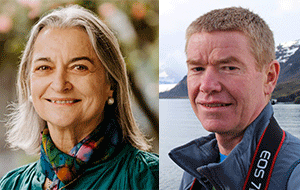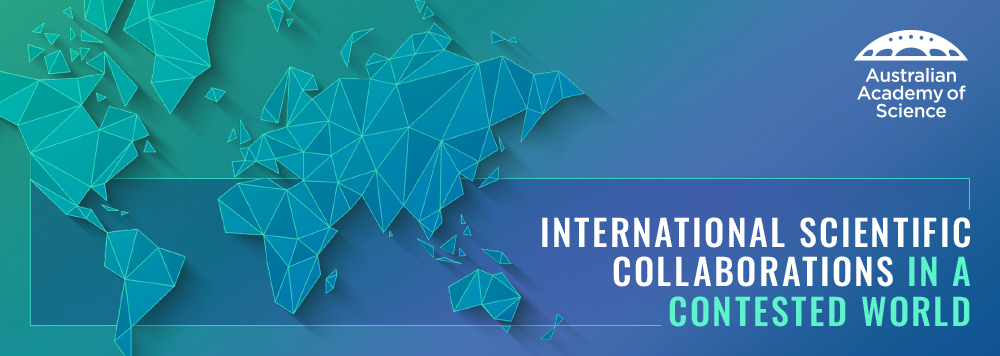
The Science Policy and Diplomacy Newsletter of the Australian Academy of Science highlights important science policy discussions and events in Australia and around the globe. We report on the involvement of science in national and international policy and diplomacy, and the Academy’s contributions to these discussions.

You don’t have to look very hard to see that we are living in a complex world of changing geopolitics and shifting tensions—from the war in Ukraine, to COVID vaccine nationalism, to competition between the USA and China. These geopolitical events are shaping the global scientific endeavour.
Scientific capability is a powerful asset that nations are keen to possess. Scientific discoveries are vital for strong economies and addressing global societal challenges such as Artificial Intelligence, digital technologies, climate change, biodiversity loss, pandemics, and food security. The well-being of nations and their citizens depends on solutions that only global scientific collaboration can secure.
Australia enjoys the benefits of international collaboration—sharing ideas and resources with other scientists drives innovation and solutions to local and global challenges and enables Australia to develop critical sovereign capabilities.
Advanced technology platforms, such as generative AI, quantum computing, and gene editing, offer new ways to generate economic value and solve social problems. However, new knowledge also brings new risks, and dealing with these risks can inadvertently act as a barrier to the way Australian scientists collaborate globally.
Risks to science such as foreign interference, regulation of scientific collaborations, critical technologies, cybersecurity, and intellectual property protection are influencing how researchers collaborate with international colleagues.
In this context, we must ask ourselves:
“Are measures to address national security risks associated with functional research collaboration?”
“What implications do AUKUS and the Defence Strategic Review have for international scientific collaboration?”
“Can science and technology help solve global challenges with the current constraints on international engagement?”
“How do we strike a balance between mitigating national security risks and enabling the benefits of open scientific collaboration?”
To explore these questions and more, we have convened the Australian Academy of Science’s 2023 National Symposium: International scientific collaborations in a contested world. We will facilitate a dialogue about how we can address national security concerns while enabling the benefits of open scientific collaboration for Australia and the world.
The symposium features keynote speakers and panel discussions with representatives from government, defence, and research.
You can view the symposium program and register at the link below.
Her Excellency Ms Caroline Kennedy, Ambassador of the United States of America to Australia, and His Excellency the Hon. Dr Kevin Rudd AC, Australian Ambassador to the United States of America, will speak at the symposium dinner on Monday 13 November at the National Gallery of Australia.
We will hear from experts who will share new data on the impacts of national security on Australia’s research collaborations and compare these to measures adopted in other nations.
The discussion paper below provides relevant background for the symposium and encourages reflection on what increasing geopolitical tensions and securitisation of science mean for the global science system and Australia’s place within it.
We hope you can join us for these important and stimulating discussions.
The Academy's 2023 national symposium will facilitate a dialogue on the role of international scientific collaboration in providing benefits to the nation and the globe in our fragmented, contested, and uncertain world.
The adoption of science and technology is essential for Australia to compete, innovate, and drive improvements in productivity and sustainability. Emerging technologies offer new ways to generate economic value—however, new knowledge also brings risks that can inadvertently act as a barrier to the way Australian scientists collaborate globally.
Australian science has a crucial part to play in securing the prosperity of the nation and the Indo-Pacific Region. This paper provides relevant background, data, and questions to stimulate thinking around scientific collaborations in a contested world.

The Australian Academy of Science will facilitate a national dialogue about how we can address national security concerns whilst enabling the benefits that open scientific collaboration offers Australia and the globe. Join us as we explore these questions and more at our annual symposium: International scientific collaborations in a contested world.
Symposium dinner
Date: Monday 13 November 2023
Time: 6.30pm—10.00pm AEDT
Venue: National Gallery of Australia
Cost: $180.00 (inc. GST)
Symposium
Date: Tuesday 14 November
Time: 9.00am—5.00pm AEDT
Venue: The Shine Dome or online
Cost: In-person $180.00 (inc. GST) or online $50.00 (inc. GST)
Register to attend both the symposium and dinner for $300.00 (inc. GST).
Registrations are limited due to high demand and the capacities at both venues.
Registrations for in person attendance close on Friday 3 October, or before, if capacities are reached. Registration for online participation closes on Friday 10 November.
© 2025 Australian Academy of Science